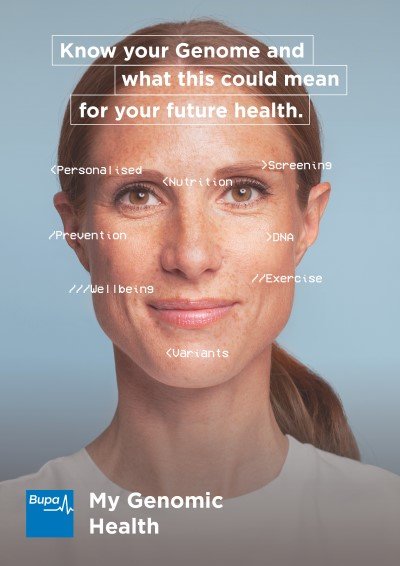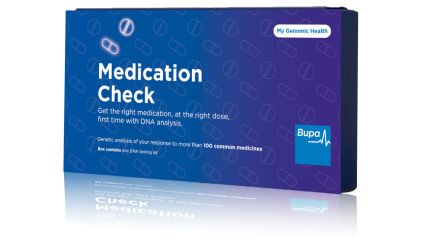The ‘My Genomic Health’ programme from Bupa is using whole genome sequencing to analyse the DNA of 14,000 people across the UK and Spain, uncovering hidden health risks in 3 out of 4 participants and helping them take early preventative action.

Bupa, the international healthcare company, has today announced breakthrough findings from its global whole genome sequencing programme, ‘My Genomic Health’. The initiative, which has so far analysed the DNA of 5,000 participants across the UK and Spain, reveals that 75% (3 in 4 people) have polygenic markers linked to a higher-than-average risk of developing conditions like high cholesterol, hypertension or type 2 diabetes - risks that can be managed through screening or lifestyle changes.
In addition, 4% of participants were found to carry high-impact genetic variants that significantly increase their likelihood of serious conditions such as cancer (1 in 33 people) or cardiovascular disease (1 in 100). These are single-gene variants that carry a much higher risk and often require earlier or more intensive preventive action.
Crucially, the two-year programme focuses only on conditions where preventive action can be taken - screening for more than 60 conditions including 10 types of cancer. It provides participants with clear, personalised insights into their genetic risk, along with expert guidance from a Bupa clinician on how to manage that risk. All participants are offered a tailored plan and ongoing support which could involve lifestyle changes, targeted screening, or medical intervention.
My Genomic Health also reveals that nearly 100% of participants carry genetic variants that could affect how effectively they respond to prescribed medications, such as painkillers including codeine, antibiotics, including flucloxacillin, and clopidogrel (a blood thinner). Choosing the right blood thinner can be lifesaving after a heart attack or stroke. Pharmacogenomics can help doctors prescribe more effective medications linked to a person’s genetic makeup, reducing side effects and improving outcomes.
Actionable health outcomes
Initial data from the programme align with Bupa's recent global research, which found 60% of people are eager to understand their genetic risk for various health conditions. Additionally, 80% indicated they would alter their behaviour if they knew they were at high genetic risk for diseases such as cardiovascular disease, diabetes, or skin cancer.
Globally, almost half of all cancers are still diagnosed at advanced stages (stage 3 or 4), limiting the effectiveness of treatment and impacting outcomes. This underscores the urgent need for early detection. Whole genome sequencing helps identify a person’s genetic risk of cancer earlier and enables clinicians to tailor treatments to the individual, potentially turning more patients into survivors.
One such example is, Ana Isabel Bernardo Rodriguez, a participant in the programme, who discovered she had a genetic risk of developing melanoma. “This prompted me to visit a dermatologist, as I had noticed a mole that had changed in appearance,” Ana shared. “During the consultation, the dermatologist removed it for analysis. Two weeks later, I was informed the mole was in the early stages of turning into melanoma. Having access to this genetic information allowed me to take preventive action and potentially avoid skin cancer.”
My Genomic Health Programme
Building on the success in the UK and Spain, Bupa is expanding the offering globally, with plans to offer genomic tests to over 250,000 people by the end of 2027.
Dr Anne Lepetit, Chief Medical Officer, Bupa, said: “This data from My Genomic Health highlights the critical role genomics can play in helping people understand their risk of serious conditions like cancer and cardiovascular disease — often long before symptoms appear. Our genetic make-up is a key factor in determining the likelihood of developing diseases. While it is understood that population-based screening for cancers such as breast, colon, or cervical cancer provide improve outcomes and reduce cancer mortality, genomics adds a new layer of precision enabling us to support people who may not currently qualify for routine screening. We can use the information to help people take proactive steps to improve health outcomes over the long term.
“These findings represent a major shift towards a more personalised and preventive approach to healthcare that empowers people with knowledge and practical support to take early action rather than waiting for illness to occur. This could be through targeted medical interventions, tailored medication or simple diet and lifestyle changes. We are now focused on significantly expanding the programme and exploring how this kind of personalised, data-driven care can support longer, healthier lives across our customer base and beyond.”
Media enquiries
Molly Morgan, Group External Communications Director: [email protected]
About Bupa
Established in 1947, Bupa's purpose is helping people live longer, healthier, happier lives and making a better world. We are an international healthcare company serving over 60 million customers worldwide. With no shareholders, we reinvest profits into providing more and better healthcare for the benefit of current and future customers. Bupa has businesses around the world, principally in Australia, the UK, Spain, Poland, Chile, Hong Kong SAR, India, Türkiye, Brazil, Mexico and New Zealand. We also have associate businesses in Saudi Arabia.



